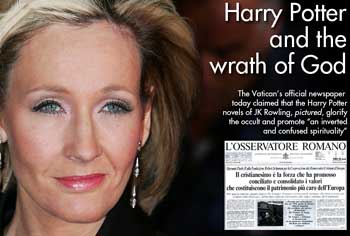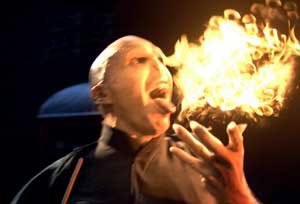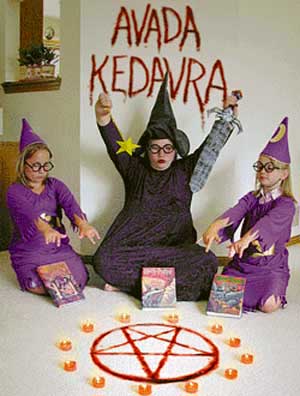Two years after its sensational praise of the sixth Harry Potter film, now in its July 13, 2011 issue, L’Osservatore Romano (OR) gave a shocking ‘double thumbs up’ to the last movie of that series: Harry Potter and the Deathly Hallows. It ran a short piece by Gaetano Vallini titled “Harry Potter's Last Battle,” assuring its readers that the eighth and last movie of the Rowling saga is “an epic finale” that clarifies good and evil. The same issue featured a second and larger article titled “Friendship and Sacrifice,” which declared the Harry Potter series is a “parable of the post-modern man.”
In the news reports I read, excerpts from the two articles were either mixed together indiscriminately or presented as one piece. Since I believe it is important to know exactly what was said so we can judge accordingly, let me look briefly at each article.
“Harry Potter's last battle”
OR journalist Vallini deems that the young students of Hogwarts have grown up and the sorcery they learned is now serving a good purpose, “fighting against the evil of the dark master and to save the world from his plans.” It is hard to believe that the Vatican newspaper would instruct the Catholic public that there are good sorcerers fighting against bad sorcerers. It is a complete disregard of Church teaching, which strongly states that all sorcery is evil, not to be dabbled with.

J K Rowling, a promoter of the occult, approved by the Vatican |
Vallini shortly recapitulates the film saga, with compliments to the fidelity of the screenplay to the novels. The only criticism he makes is that the preceding film was too drawn out and tedious. The lone feeble word of caution regards violence.
The main appraisal of the film’s content is that the cards are on the table now in the struggle between good and evil. The values of friendship and sacrifice are stressed. In a “unique and long story of formation,” the hero and his companions “mature from the lightheartedness of childhood to the complex reality of adulthood.”
Vallini concludes that Harry Potter, Ron and Hermione have grown up: “They have certainly realized that magic is only a narrative pretext, a tool in the fight against an unrealistic quest for immortality.” The spells are finished for the actors and audience, according to the Vatican journalist. His last words express a “hope for a sequel.”
“Friendship and Sacrifice”
The second article in that same OR issue is by Antonio Carreiro. He could hardly be more lavish in its praise. He is enthralled with the multitude of Potter fans, with the $6 billion profit the film series has reaped, and with the last and final film. “A phenomenon that knows no equal when we consider it in its entirety,” he asserts.
He presents an ecumenical Potter who “fascinates, transmitting to children and adults ideals shared by non-believers and those who have had occasion to speak of the Gospel to the little ones.”

Lord Voldemort “does not represent Satan” |
In his task of rinsing Potter, Carreiro justifies him as a “parable of post modern man.” Lord Voldemort, also, “does not represent Satan.” He is just a man who “made the wrong choices, preferred evil to good, has not bothered to understand that love is a power that goes beyond himself. His resemblance to a serpent is a good metaphor to say that anyone who does not love a person is not truly human.”
Thus, according to the OR article, it is not necessary to be Catholic to be good. Potter, the good wizard – “although he never declared himself Christian” – invites the bad wizard “to re-analyze his life, to repent, and to recognize the primacy of love over everything in order not to be eternally damned.” To be saved, according to this new gospel of Harry Potter, it is enough to love another human being. The mortal sin of Voldemort is his individualism and failure to love man, not God.
This is the strange message of Carreiro article in L’Osservatore Romano, certainly at variance with Church teaching.
A confusing Vatican flip flop
I personally know several young Catholics who casually said they played with an ouiji board at a Harry Potter party. Other games involved casting spells and throwing curses. These youth were surprised when I told them the Church forbids this type of games, which in fact is playing at black magic.

While L'Osservatore Romano flip-flops, black magic takes over Catholic homes |
Up until 2008, I could tell those youth the Vatican disapproved of the Potter magic. Indeed, in an article titled “The Double Face of Harry Potter” (L’Osservatore Romano, January 15, 2008), Edoardo Rialti condemned it precisely because it extended an invitation to the occult and magic.
His arguments, briefly stated, are these:
- There are only seemingly Christian values in the story, because at base it proposes witchcraft as a positive ideal;
- It presents a universe where evil is good;
- The wizards, the heroes, violently manipulate people and things thanks to their knowledge of the occult; it is the old Gnostic temptation of confusing salvation and truth with secret knowledge;
- The young wizards have a disdain for ‘normal’ men (Muggles) who do not know magic.
- There are many dangerous half-truths in this story, which raise up Harry Potter as “the wrong and malicious kind of hero.”
It seems to me that this critique, objective in 2008, remains true today. In fact, it could be said that now it is more timely and compelling in face of the growing interest of youth in the occult and magic. Neo-paganism claims to be the fastest-growing religion in North America – especially among young people – with the Internet being the prime means of proselytizing.
So, what happened with L’Osservatore Romano? Why did it change its stance on the Harry Potter series? How can what was bad suddenly become good? I don’t know the whole answer, but this change certainly gives me the impression of a fluctuating concept of evil and, consequently, a new concept of morals.
One can only wonder whether, by giving this contradictory orientation, the Vatican is not helping to destroy Church Morals.

Posted July 25, 2011
|